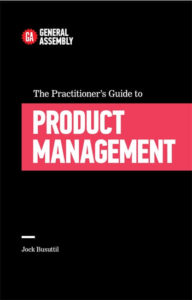
PRODUCTHEAD: More than making the right moves with frameworks
PRODUCTHEAD is a regular newsletter of product management goodness,
curated by Jock Busuttil.
product on the ladder #
tl;dr
Frameworks help to spur thinking; they don’t provide the answers
“I would be nothing without my dev teammates, but my devs would probably get on pretty well without me.”
Use frameworks with discretion – and expect a bit less of them
a favour: please share this with other product people
every PRODUCTHEAD edition is online for you to refer back to
hello
A while ago, I used to practice aikido, a martial art associated (somewhat embarrassingly) with Steven Seagal, an action movie star best known for Under Siege. But that’s not important right now.
As I’m sure is the case when starting to learn any martial art, sport, dance style or musical instrument, an experienced teacher will start their students off by helping them learn the basic movements.
In my case, it was literally having my hands, feet, and body posture choreographed, one step at a time, until I understood the movement. Then it was practice, practice, practice until I could perform the throw, restraint or whatever consistently well.
As the motions became engrained into muscle memory, we’d start to combine them together into more complicated set pieces. We’d start to introduce weapons, such as staffs, knives and swords into the mix (all wooden, I hasten to add — nobody wanted to lose an appendage).
We did this not so much because we wanted to be like Steven Seagal and other action movie stars (okay, one or two of us did), but rather to understand that we could reapply the same fundamental techniques we’d already learned in more varied scenarios. For example, a defence against an unarmed haymaker punch can be employed just as effectively when the assailant is swinging a weapon of some sort. (With practice.)

We’d also start to think beyond the physical movements to the underlying intent of the movement. Why are we moving in this particular way? What effect does it have on the opponent? Why doesn’t it work sometimes? How do we fine-tune it? How do we adapt it for different scenarios?
And then, as we clambered up the ladder of enlightenment, we’d try to reach the state of ‘flow’, where the intent of the activity was less about self-defence, and more about self-expression and inner state of mind.
If that sounds all a bit too spiritual for this time of day, then think of a time when you last watched someone who was at the top of their game. Perhaps it was a sportsperson, perhaps a favourite musician or other artist. They were no longer simply going through the motions, they’d clearly tapped into something altogether more wonderful. They were expressing themselves and telling their own story through the medium of their sport, music or art.
My point is that attaining a true mastery of any discipline takes time, a lot of practice, and a good teacher (even if you eventually become your own teacher). In product management, we all start out with some kind of process or framework for our basic movements. We might learn this from training, talks, writing, or by mimicking our colleagues.
In the beginning, we follow the established process blindly because we don’t know enough yet to do it any differently. Doing so helps us to get started, but will only take us a short way towards mastery.
It’s not enough simply to make the right moves, we also need to understand why we’re doing so, how to adapt our techniques for different scenarios, and when it’s okay to throw out the rulebook. We need to understand the underlying intent of what we’re doing as product managers.
A framework is there to guide us, in much the same way as the guardrails at the side of a twisting mountain road are there to remind us which path to follow, and to avoid any unintentional mishaps. It remains our responsibility to steer the vehicle. It is somewhat missing the point if we grind the side of our car into the guardrails, abandon any active attempt to steer, and simply hope the guardrails will slingshot us in the right direction.

So when I say I don’t really endorse any particular product management framework, it’s not because I think they hold no value. Rather it’s because it’s too tempting for people to think the framework is all there is: “if we follow the process really, really carefully, we’ll get a good result.” Not so.
You don’t learn product management in its entirety from a short training course, video or book. What you learn are the basic movements to get you started, and maybe a bit of insight into why and when things work best. The rest is practice, practice and more practice, and of making and learning from mistakes.
Over the course of years, maybe you’ll transcend the simple act of going through the motions. I’m not there yet, but I’ll let you know when I reach enlightenment.
Speak to you soon,
Jock
what to think about this week
Product frameworks are rubbish. Now use one.
Throw a rock at a product department and you’ll hit a few frameworks. Mostly with contrived acronyms (yet cutesy in a dad-joke kind of way).
And they’re all rubbish. Hogwash. Pretty stories without teeth.
[Ron A / Medium]
Product management is becoming cringe
Content warning: sweary
Is it just me or is product management becoming a cringe field. [sic]
Product management is the new “agile” (or worse, SAFE). It’s often empty, meaningless hype driven by consultants and schools and the cottage industry of courses, books, and certificate programs.
Your role has value, but you’re not the saviour
[u/Able_Mess_3449 / Reddit]
When strategy frameworks mislead
“It’s OK, sir; we’re industry analysts,” he said, holding up his own badge for inspection. Without missing a beat, another colleague offered: “And we have a framework.”
It was a light moment of geek humor, and a self-deprecating jab at a profession that sometimes takes itself just a bit too seriously. But it was also a reminder of how deadly serious we can all be about strategy frameworks. And how we often expect them to practically save lives.
In our effort to produce simple, we often achieve simplistic
[Jake Sorofman / ProductCraft]
recent posts
Will platforms conquer the world?
Product managers of software and hardware platforms face unique challenges that PMs of ‘regular’ products do not.
In this panel discussion, Hans-Bernd Kittlaus discusses platform product management with Samira Negm, Peter Stadlinger and Jock Busuttil.
[I Manage Products]
As head of product, should I be a player-manager, or hire and delegate?
“There’s plenty that needs doing with the products. I could focus on the hiring process, but the only product manager on my team has their hands full, so I can’t delegate any more to them. I could get stuck in with the products myself as a player-manager, but this means I won’t have time to hire.”
[I Manage Products]
Billion-dollar platforms — how they did it
I was asked recently whether platforms will conquer the world. My view? They already have. In this article I share how they’ve done it, and how you can successfully bring your own platform to market.
[I Manage Products]
upcoming talks and events #
We have a couple of dates coming up for our Advanced User Research masterclass.
Friday 10th February 2023 · 10:00 – 12:15 (UK time)
Friday 24th February 2023 · 10:00 – 12:15 (UK time)
This live, online session is an introduction for product managers and their delivery team to advanced user research concepts and techniques.
If you’ve already had some experience of discovery research and user testing but want to go deeper, this masterclass will provide you and your team members with an advanced user research toolkit. You’ll grow your interpersonal skills, which will be valuable in other areas of your work too.
We offer subsidised pricing for individuals paying their own way.
can we help you?
Product People is a product management services company. We can help you through consultancy, training and coaching. Just contact us if you need our help!
Helping people build better products, more successfully, since 2012.
PRODUCTHEAD is a newsletter for product people of all varieties, and is lovingly crafted from gluten-free pizza dough.


Leave a Reply